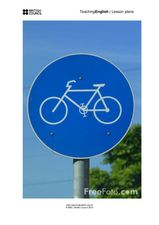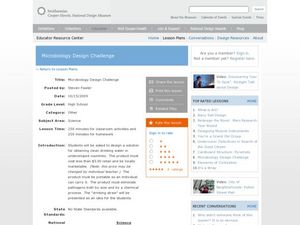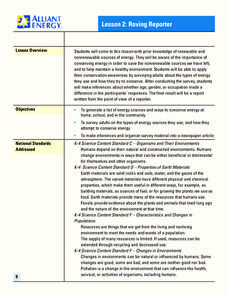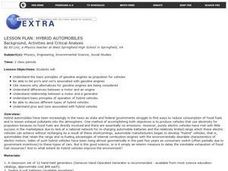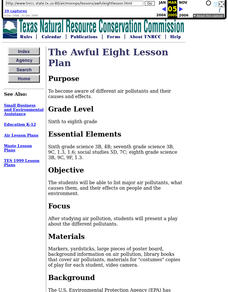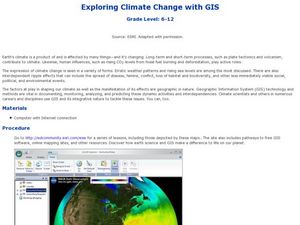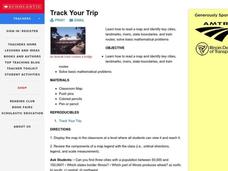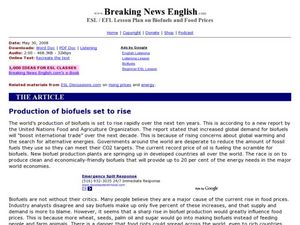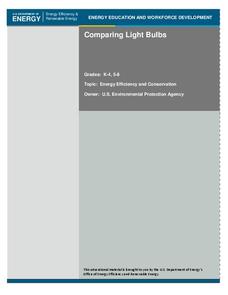Curated OER
Summarizing
Students analyze and summarize the main aspects of a news story. They find the "Who, What, Where, When and Why in a particular news story.In addition, they answer six questions over a particular story and then write a news story from...
Curated OER
Renewable vs. Non-Renewable Resources
Fifth graders identify renewable vs. non-renewable resources and comprehend why conservation of resources is important. They are asked what they think the words natural and resource mean. Pupils then put the words together to define...
Curated OER
World Geography: Climate Change Round Table
Students are able to explain the suspected causes of relatively recent climate changes, specifically the observed global warming. They discuss how unusual or extreme global warming disrupts the balance of the earth's geo-spheres.
Curated OER
Water and Ice
Students observe what happens to water as it goes from a solid to a liquid. In this exploratory instructional activity students gain an understanding for the water cycle while working in groups observing what happens to water as it...
Curated OER
Beyond Organic?
Students examine the critiques of organic agriculture and its production and marketing approaches. In this sustainable agriculture lesson students study how the ideas about ethics of the food system are changing.
Curated OER
Teaching English: Reducing Emissions by Cycling
For this ESL worksheet, students analyze an abstract picture and create the persona of a cyclist. Students cut apart cards with controversial statements regarding cycling and discuss them. Students then discuss what they personally would...
Curated OER
Hometown Ecology
Students examine how ecology is at work in their own community. As a class, they identify what they already know about the world around them and discuss how they personally affect the environment. Using magazines, newspapers and the...
Curated OER
Microbiology Design Challenge
Young scholars discover dangers to human health by researching what's in our drinking water. In this water purification activity, students discuss the conditions of water in undeveloped countries and why it is unsafe to drink. Young...
Curated OER
Roving Reporter
Students write a report about energy use. In this conservation lesson, students interview adults about their use of renewable and nonrenewable energy. Students synthesize this information and write a report from the point of view of a...
Curated OER
Hybrid Automobiles
Pupils explain the basic principles of gasoline engines as propulsion for vehicles. They cite reasons why alternatives for gasoline engines are being considered and explain differences between a motor and an engine.
Curated OER
Global Warming--Points of view
Students are introduced to global warming through analysis of political/editorial cartoons dealing with the subject. They discuss the cartoon and what the feel it means and then discuss the mechanics of and the concerns about global...
Curated OER
The Awful Eight Lesson Plan
The students list major air pollutants, what causes them, and their effects on people and the environment. Students list ways they can prevent or reduce the types of air pollution mentioned in the play.
Curated OER
Exploring Climate Change with GIS
Students investigate climatological changes that are occurring to the Earth. In this climate change lesson, students access an assigned web site to view maps and lessons that show how climate change makes a difference to life on Earth.
Curated OER
Track Your Trip
Fourth graders are shown how to read a map and identify key cities, landmarks, rivers, state boundaries, and train routes. They solve basic mathematical problems. Students reivew the componets of a map legend. They are asked to find...
Curated OER
Breaking News English: Production of Biofuels Set to Rise
In this ESL worksheet, students read or listen to an article about the production of biofuels. Students complete all or some of the 100 activities available here including discussion, listening, vocabulary and comprehension.
Curated OER
Energy: Exploring Alternative Forms
In the study of science, there is always
going to be research, data, theories and wonderful new discoveries. I feel that my interest
about energy will help me design an adequate unit full of intrigue and discovery. The
pupils should also...
NOAA
Communicate!: Create a Unique Message About Climate Change
Scholars use their communication skills to express their take on climate change in the ninth installment of the 10-part Discover Your Changing World series. They create ways to deliver their messages on a specific aspect of climate by...
Curated OER
Household Conservation/Efficiency
Hook your class up to an online home energy usage calculator so that they can estimate the amount used per month by their families. Then give them Watt meters with which they will measure the power consumption of several small...
Chicago Botanic Garden
Historical Climate Cycles
Ice core samples give scientists access to climates of old—those from more than 800,000 years ago. Through an analysis of various temperature graphs from ice cores, tree rings, and weather stations, scholars compare historical climates...
Intel
Energy Innovations
Collaborative groups examine the importance of energy resources on quality of life by researching different energy sources and alternative energy sources through data analysis. They make a comparison of different countries and cultures,...
Curated OER
Global Warming Webquest - Policy Analyst
In this science global warming worksheet, students, working in groups, answer 7 short answer questions regarding the policies of becoming a policy analyst in California.
Curated OER
Comparing Light Bulbs
An average home produces twice as many emissions as an average car. Teach your class how to reduce energy consumption by replacing standard incandescent light bulbs with compact fluorescent light bulbs. Perform an experiment to compare...
Chicago Botanic Garden
Calculating Your Ecological Footprint
You can lower your ecological footprint by recycling! Lesson four in this series of five has individuals, through the use of a computer, calculate their ecological footprints. Through discussions and analysis they determine how many...
Chicago Botanic Garden
Personal Choices and the Planet
The last activity in the series of four has individuals determine steps they can take to reduce their carbon footprints and then analyze their schools' recycling programs. Through a sustainability audit, they identify how and where their...







